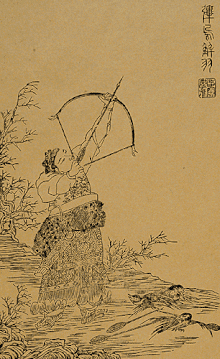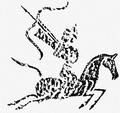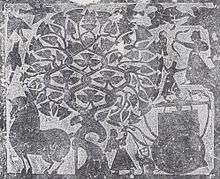Hou Yi
Hou Yi (Chinese: 后羿; pinyin: Hòu Yì; Wade–Giles: Hou I) is a mythological Chinese archer. He was also known as Shen Yi and simply as Yi (羿). He is also typically given the title of "Lord Archer". He is sometimes portrayed as a god of archery descended from heaven to aid mankind. Other times, he is portrayed as either simply half-divine or fully mortal. His wife, Chang'e (嫦娥 Cháng'é), is a lunar deity.[1]

Lore
In Chinese mythology, there were 10 suns. Initially the 10 suns would cross the sky one by one, but one day all 10 suns came out at once scorching the earth. Hou Yi was tasked by the mythical King Yao to rein in the suns. Hou Yi first tried to reason with the suns. When that didn't work, he then pretended to shoot at them with his bow to intimidate them. When the suns again refused to heed Hou Yi's warnings, he began to shoot at them one by one. As each one fell, they turned into 3 legged ravens. Finally only one sun was left and King Yao as well as the sun's mother asked for him to be spared for the prosperity of man.[2]
Hou Yi was also known for the slaying, maiming and imprisonment of several other mythical beasts such as Yayu, Zaochi, Jiuying, Dafeng, Fengxi and Xiushe. He had been directed by King Yao to go after these creatures as they were all causing trouble for humans. [3]
Hou Yi was gifted the pill of immortality by the gods. One of Hou Yi's apprentices called Pang Meng (逢蒙) broke into Hou Yi's house in search of the pill of immortality while Hou Yi was out hunting. His wife Chang'e swallowed the pill before Pang Meng could get it. After eating the pill, Chang'e rose up to the moon.[4]
In another version, after Hou Yi shot down the suns, he was proclaimed as a hero-king by the people. Though, once he was crowned king he became a tyrant and subjugated his people. Hou Yi had also obtained immortality elixir from Xiwangmu to live forever. Chang'e was afraid that if he lived forever, that people would forever be victim to his cruelty. Therefore, Chang'e consumed the elixir herself and floated away. As she did, Hou Yi tried to shoot her down but failed. For her sacrifice, people have taken to honoring her during the Mid-Autumn Festival.[5]
Historical references
Hou Yi—usually conflated with the legendary figure in ancient sources—was also a tribal leader of prehistoric China who according to the Bamboo Annals attacked the Xia during the first year of the reign of King Taikang and occupied his capital Zhenxun while Taikang was hunting beyond the Luo River. Hou Yi was deposed by his lieutenant Han Zhuo in the eighth year of the reign of Taikang's nephew Xiang of Xia.
 Relief rubbing of Houyi
Relief rubbing of Houyi Houyi takes aim at the Suns (right upper corner), rubbing from the Wu Liang Shrines reliefs
Houyi takes aim at the Suns (right upper corner), rubbing from the Wu Liang Shrines reliefs
See also
- Mid-Autumn Festival for variants of this legend
- Korean creation narratives
References
- "Hou Yi". Encyclopedia Britannica.
- Walls, Jan (1984). Classical Chinese Myths. Joint Publishing Co. p. 68-69.
- Masako, Mori (1995). "Restoring the "Epic of Hou Yi"". Asian Folklore Studies. 54 (2): 239–257. doi:10.2307/1178943.
- "Chang'e, Chinese Deity". Encyclopedia Britannica. The Editors of Encyclopedia Britannica. Retrieved 8 March 2018.
- Yang, Lihui; An, Deming; Anderson Turner, Jessica (2008). Handbook of Chinese Mythology. Oxford University Press. ISBN 9780195332636.